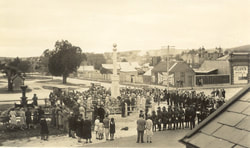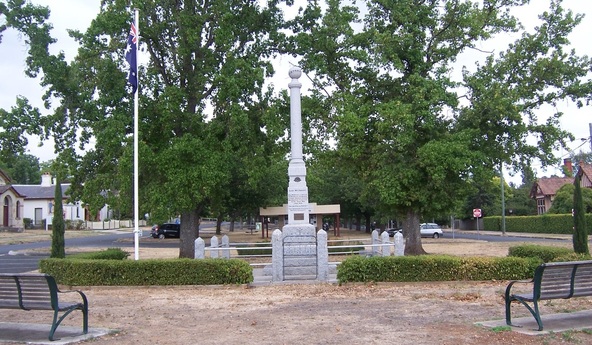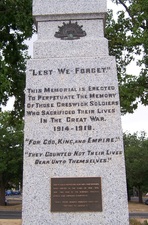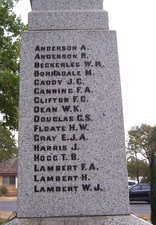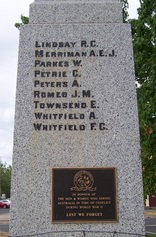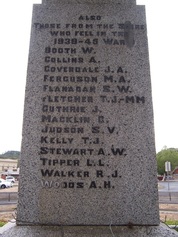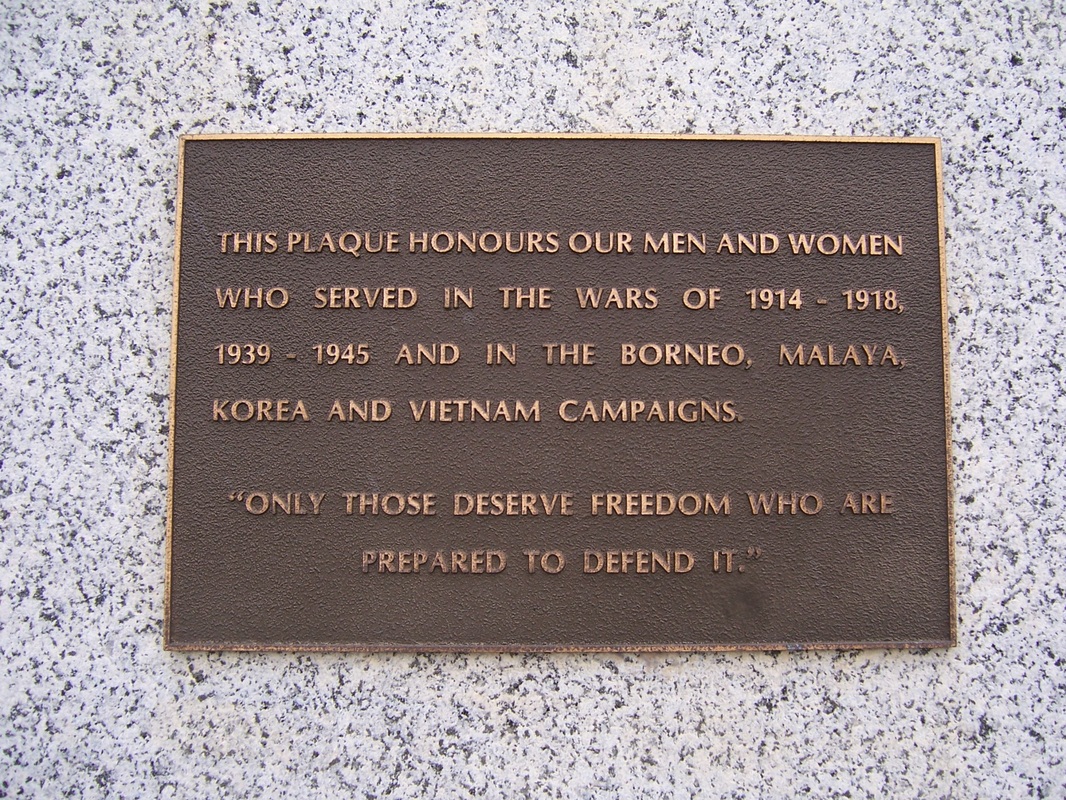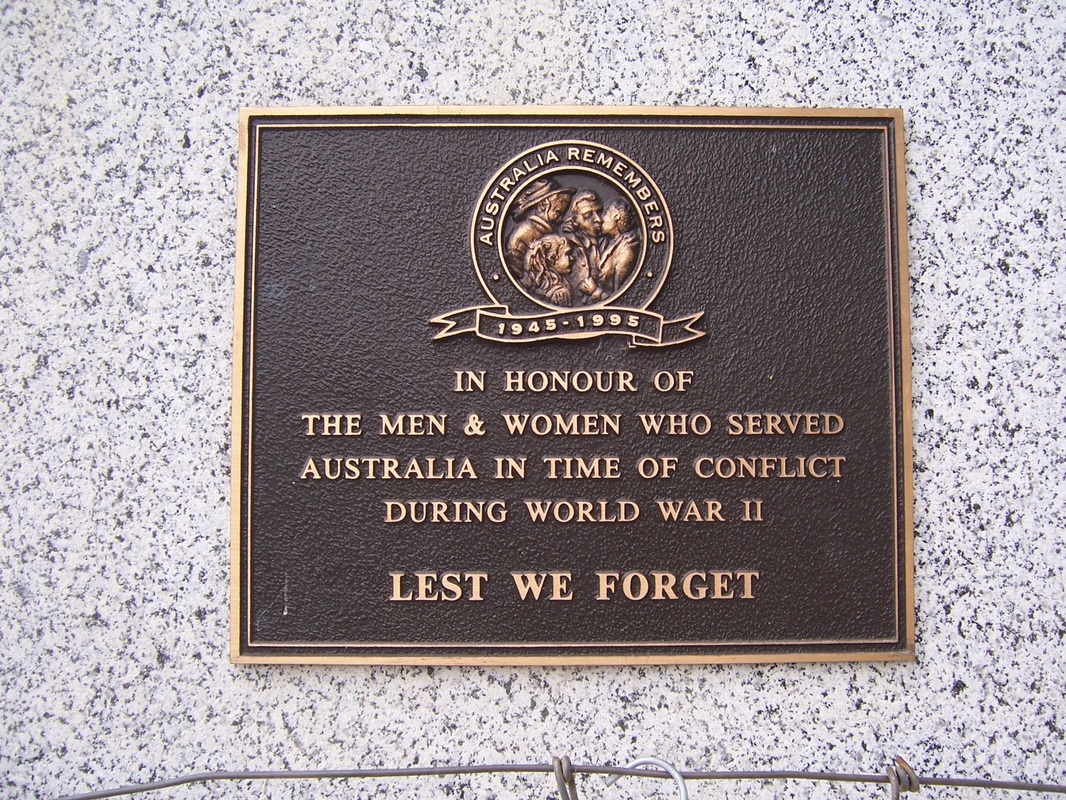Cenotaphs - Creswick
(originally Fallen Soldiers Memorial)
Memory to the Fallen
Round the district there are many memorials and trees to those that served in the Great War. The Avenue at Kingston commemorates those that enlisted from the district. The first honour rolls were first started by the churches and schools, some before the end of the war. The Kingston Avenue of Honour planting started in 1918 and officially dedicated in 1927. In Creswick’s Town Hall on three marbles slabs are the names of those that enlisted for WWI associated with the Borough. Although started in 1925 the memorial it was not completed until 1932. But before both events the Borough of Creswick erected the Cenotaph, which was unveiled Sunday, September 7 1924. In those days it was known as Fallen Soldiers’ Memorial.
After the end of the Great War both municipalities, the Shire and Borough of Creswick, considered a joint project to those that lost their lives. The erection of an infectious diseases ward at the Creswick District Hospital was proposed, but the estimated cost was great and in the end they did not persevered with the project. The Shire of Creswick under the chair of Major Parkin decided to plant an avenue of elms for all those that went to war. The Borough dragged their feet and it was not until May 1922 a meeting of interested residents was held to decide what the memorial would be. Some residents still favoured a ward for the hospital, others a kitchen for the nurses. Mr. Howie favoured an Avenue of Trees like the Shire. After much discussion they adjourned the meeting in favour of Sir Alexander sending up the Assistant Government Architect to draw up plans and costing.
Although the fund had been started November 1920 with nearly £100 in the fund it was not until December 1923 that the possibility of a monument started to become a reality. Although a motion to erect the monument to be erected in Market Square, Mr. Howie was now proposing that the monument be sited at Cooper’s Reserve. It was felt that there was already too many items in the square. A number of mothers expressed a preference for Cooper’s Reserve. His motion was seconded by Mr. Gurr. The Council intended to erect a fence round the area and seats could be added. Although Mr. Grose spoke against it the motion was carried. A committee was formed with the Mayor asking to be excused as he planned to submit a tender to erect the monument. It was decided to call for subscriptions to pay for the monument. A listing of all donations was published in the paper even if it was just 2/-. Lionel Lindsay gave a guinea. Mr. Bloom (the Mayor) did win the contract to erect the monument for £250 but unfortunately their plans to erect it at Cooper’s Reserve were not realised. The Creswick Advertiser for the 8th August reported that when excavating for the memorial it was found the site was not suitable when the old creek bed was uncovered. A hasty Council meeting decided to erect it in Market Square.
Courtesy Margaret Fullwood
Round the district there are many memorials and trees to those that served in the Great War. The Avenue at Kingston commemorates those that enlisted from the district. The first honour rolls were first started by the churches and schools, some before the end of the war. The Kingston Avenue of Honour planting started in 1918 and officially dedicated in 1927. In Creswick’s Town Hall on three marbles slabs are the names of those that enlisted for WWI associated with the Borough. Although started in 1925 the memorial it was not completed until 1932. But before both events the Borough of Creswick erected the Cenotaph, which was unveiled Sunday, September 7 1924. In those days it was known as Fallen Soldiers’ Memorial.
After the end of the Great War both municipalities, the Shire and Borough of Creswick, considered a joint project to those that lost their lives. The erection of an infectious diseases ward at the Creswick District Hospital was proposed, but the estimated cost was great and in the end they did not persevered with the project. The Shire of Creswick under the chair of Major Parkin decided to plant an avenue of elms for all those that went to war. The Borough dragged their feet and it was not until May 1922 a meeting of interested residents was held to decide what the memorial would be. Some residents still favoured a ward for the hospital, others a kitchen for the nurses. Mr. Howie favoured an Avenue of Trees like the Shire. After much discussion they adjourned the meeting in favour of Sir Alexander sending up the Assistant Government Architect to draw up plans and costing.
Although the fund had been started November 1920 with nearly £100 in the fund it was not until December 1923 that the possibility of a monument started to become a reality. Although a motion to erect the monument to be erected in Market Square, Mr. Howie was now proposing that the monument be sited at Cooper’s Reserve. It was felt that there was already too many items in the square. A number of mothers expressed a preference for Cooper’s Reserve. His motion was seconded by Mr. Gurr. The Council intended to erect a fence round the area and seats could be added. Although Mr. Grose spoke against it the motion was carried. A committee was formed with the Mayor asking to be excused as he planned to submit a tender to erect the monument. It was decided to call for subscriptions to pay for the monument. A listing of all donations was published in the paper even if it was just 2/-. Lionel Lindsay gave a guinea. Mr. Bloom (the Mayor) did win the contract to erect the monument for £250 but unfortunately their plans to erect it at Cooper’s Reserve were not realised. The Creswick Advertiser for the 8th August reported that when excavating for the memorial it was found the site was not suitable when the old creek bed was uncovered. A hasty Council meeting decided to erect it in Market Square.
Courtesy Margaret Fullwood
When the Monument was built, the Council decided the following:
1. You had to be born in Creswick
2. You had to have died in WW1
3. You had to have family still living in Creswick (1924)
This meant many Creswick boys will were killed in action die not get their names on the Monument.
All names of those killed in action are on the Creswick Honour roll - The Great War in the Town Hall.
1. You had to be born in Creswick
2. You had to have died in WW1
3. You had to have family still living in Creswick (1924)
This meant many Creswick boys will were killed in action die not get their names on the Monument.
All names of those killed in action are on the Creswick Honour roll - The Great War in the Town Hall.
Fallen Soldiers’ Memorial
Unveiling Ceremony - Sunday, 7th September 1924
Unveiling Ceremony - Sunday, 7th September 1924
Tuesday, 9th September, 1924 – Creswick Advertiser page 2
After many delays, the Creswick Borough Fallen Soldiers’ Memorial has now been erected in Market Square, at the intersection of Albert, Cambridge and Raglan streets, the contractor being Mr. Alex Broom, monumental mason, of Creswick. The unveiling ceremony took place last Sunday afternoon, in fine weather, and in the presence of a very large crowd, in which the surrounding districts, Ballarat, Clunes, Ascot, etc., were well respected. Seating accommodation had been provided for many of the ladies, and the speakers were placed on a lorry. The memorial had been draped, and a laurel wreath placed above the draping. At the base there were wreaths from Sir A. J. and Lady Peacock, and from the Creswick branch of the Red Cross Society, with suitable inscriptions. The Creswick Victory Brass Band, under the leadership of Mr. Herb Vague played a couple of selections prior to the opening of the proceedings, which commenced with the National Anthem.
The Mayor (Cr. Thos. Cushing) was the chairman, and he carried out the duties well. He read apologies for absence from Sir John Monash, Revs. R. Whitford and S. A. Eastman, the Mayor of Ballarat City (Cr. A. Levy), Hon. F. Brawn, Mr. J. A. Graham, Dr. T. A. Wilson, and the Old Creswickian Association.
The Mayor said they had present that afternoon a number of representative men who had come to join with them in doing honour to those brave Creswick boys who had fallen in the Great War. His duty was both a pleasing and a sad one – pleasing that his first official act as Mayor should be to preside over a gathering to honour those brave boys; and sad because he knew that old wounds would be opened in the hearts of those parents who had lost their brave sons. Their hearts went out in sympathy to them. They rejoiced with them in their pride, and felt with them in their sorrow. The Creswick people had erected that stone to the memory of the brave boys. They were all known to them personally. On their behalf he dedicated the stone to their memory, and he trusted it will always be looked upon, not as a symbol of war, but as a symbol of peace; that the sacrifice made by those brave boys had not been in vain; that a greater and better world will emerge; and that wars of the future will be conducted in the halls of peace, with intellect against intellect, and all imbued with the idea to make the world a better one to live in. the names on the memorial are of those boys who fell at the war whose parents resided in Creswick at the time of enlistment. He would ask Mr. Lambert to unveil the memorial. Mrs. Lambert had been asked to do so but did not feel able to, so Mr. Lambert had been invited to unveil it; he had lost three sons at the war, and was entitled to the honour.
Mr. W. H. Lambert then unveiled the memorial, at the same time saying :- “I unveil this memorial in honour of the brave lads who sacrificed their lives in the Great War.”
The band played “O God, our help in ages past.”
In raised lead letters the following inscription appears on the monument:-
“Lest We Forget”
This memorial is erected to Perpetuate the Memory of those Creswick Soldiers who Sacrificed Their Lives in the Great War.
1914 – 1918
“For God, King, and Empire.”
“They counted not their lives dear unto themselves.”
The names of the fallen soldiers appearing on the Memorial are:-
ANDERSON, A.
ANDERSON, R.
BECKERLEG, R.W.
BORRODALE, M.
CADDY, J.C.
CANNING, F. A.
CLIFTON, F. C.
DEAN, W. K.
DOUGLAS, G. S.
FLOATE, H. W.
GRAY, F. J. A.
HARRIS, JOHN
HOGG, T. B.
LAMBERT, F. A.
LAMBERT, H.
LAMBERT W. J.
LINDSAY, R. G.
MERRIMAN, A. E. J.
PARKES, W.
PETRIE, G.
PETERS, A.
ROMEO, J. M.
TOWNSEND, E.
WHITFIELD, A.
WHITFIELD, F. C.
Mr. D. C. McGrath, M.P. for Ballarat, said he also was present with mingled feelings. As Federal member for the district he had pleasure in joining with them in doing honour to the brave lads who fell in the great 5 years’ war. With the Mayor, he hoped the memorial would be a symbol of peace, and not a symbol of war. He hoped that they would never again have to assemble to unveil a memorial. If the people were determined there would be no more war. He spoke of Mr. Ramsay MacDonald, the British Prime Minister, writing to the people over the heads of the leaders in France and the military Junkers in Germany, appealing to those who suffered through war. As a result the French people returned a majority against their Government, so that the Prime Minister of France was shaking hands with the Prime Minister of Great Britain, and they were meeting at Geneva that day, when it was hoped they would decide in favour of disarmament. He helped the appeal of Ramsay MacDonald would be heard and listened to, and he was satisfied that if those who suffer in war did that, there would never be another war. Building battleships and arming to the teeth never prevented war. They had been told the war was to end war, but they had the sad and sorry spectacle in Australia of having spent 17 ½ millions of money, squandered among the “brass hat brigade” since the war. They were talking of spending millions on two cruisers, which would be obsolete in a few years, and they would have done to them what had been done to the Australia. He was pleased that John Lemmon (the State Minister of Education) had given a lead to the people, by declaring that the school books should no longer contain stories as to what a great thing war is. If they filled the minds of the children with these stories, if they inculcated in them that we are so much better than any other Nationality, then we will be sowing the seed of another war. We want stories of industrial and such-like triumphs. He hoped when they passed the memorial they would look on it as a symbol of peace, and that never again would the country be plunged into another war. He had only three months in the front line, but in that time had seen all the horrors, all the tragedy he ever wanted to see in this world. His little effort would be to help to prepare for peace, and not for war. He joined with them in commemorating the brave deeds of the lads who fell, and hoped Australia would never forget their widows, and children. As a member, he was ready and accessible at all times to see that his country, through Parliament, did justice to those who had lost their breadwinners; to do away with secret diplomacy; and stop such a tragedy as the Great War.
The band played another selection.
The Rev. F. H. Ingamells, who was a chaplain with the Australians overseas in the great war, said he esteemed it a very great honour to be asked to speak to them on such an occasion. It was one of the unique events in the history of Creswick. Never had they had such an experience, and never would they have again, God pleasing, such an occasion, so a great responsibility was thrown on him as to what he said. Some people say these memorials are erected so that they would not forget. He thought the people never will forget. The memorial was placed there, with the names on it, not that they would not forget, but that they would not cease to remember what had been done for them, particularly by those who gave their lives. He understood the memorial was to have been placed on another site, but the formation was found to be uncertain, rotten, so they had placed it on a sound foundation. He wanted them to think what they were building their nationhood on in the future. Those who had gone would take no active part in the work of reconstruction and of construction, so they would have to build on a sure and sound foundation, so the surest thing to build on is the spirit of sacrifice, the sacrifice of their own thoughts for the greater end. These boys were sent by them to do their jobs, and God blest their work and blest those who sent them. If they built on the foundation of sacrifice, and also on that of selflessness, they would build a great foundation. They should not eliminate the names of great men who perhaps became great through war. They might as well cast out the name of Jesus Christ from the Gospel as cast out the names of these men and their great deeds even though they were performed in the tragedy of war. It was the gospel of sacrifice, and they had to learn from it. War, as war, is absolutely damnable, but war for Christ’s sake and for good is better than anything else. So they had to remember the names of these men and their glorious deeds. They would never forget, but for God’s sake never cease to remember. He hoped the memorial will not be the consummation of their memory for the brave lads who fell, but that it would be a reminder to them to go on in the same spirit that they displayed, and so build up the country on the sure and sound foundation.
Sir A. J. Peacock, M.L.A., said it was no idle curiosity that brought the people there that afternoon, but their desire to pay a tribute to the brave lads who answered the call of duty in the Great War, and made the supreme sacrifice. It was a rather tardy recognition of services rendered. Little had they thought that the war would turn the world upside-down. Who would have thought when the war broke out on 4th August, 1914, that there would be such a magnificent response from the young men of the dominions, 1,068,000 going from Canada, Australia, South Africa and other parts to help the Mother Country? They all hated war, but there were principles to be upheld. The hope of any country is in its rising generation. Critics used to visit Australia and go back and say the average Australian would not be like his forbears. The answer came at the time of the Great War, when they showed they were prepared to sacrifice their lives against Germany and Austria. So long as the world lasts the bravery of the men of the dominions would be remembered. One of the greatest English generals had said of them that they would go on and through, but would never go back. The race had not deteriorated, and the Nation that suffered is better for the suffering. As a son of the soil, born within a stones throw of the memorial, as a member for the district, he was glad to be able to pay a token of admiration and respect for the brave boys. Their bodies are buried elsewhere, but their names will never die. “To live in the hearts of those you leave behind is never to die.” He was glad they had met on a Sunday to unveil the memorial, for that was the proper day for it. Sir Alexander went on to refer to how the Australians were honoured in France. They had heard of brave deeds in wars of the past, which lasted but a short period, but greater deeds were performed in the Great War which lasted 5 years. They fought for liberty, and they triumphed. No one wanted war perpetuated and they hoped for good from the League of Nations. Future generations would be told of the great sacrifices of the men whose names were engraved on the memorial.
Mr. C. P. Howie, the secretary of the committee, gave details of the movement to erect the memorial stated by the Rev. F. H. Ingamells. It had later been decided to aim at raising £300, of which £250 was to be spent on the memorial and £50 for a tablet in the town hall to record the names of all who went to the war from the borough. The memorial had cost £276/7/1. The previous week £40 had been received from the Creswick Red Cross Society, and all debts had been liquidated. He made an earnest appeal for funds to complete the works they had commenced.
A collection was taken up by Messrs W. P. Northcott, G. Tait, A. B. Grose and F. Gibbs, fathers of soldiers, and it realised £20/8/5. The band played a selection.
Lady Peacock, President of the local branch of the Red Cross Society, spoke on behalf of that body. She said they were only too pleased to be able to do their little bit towards the erection of the memorial for the boys who had sacrificed so much, for nothing was too good for them. They had sacrificed everything in the Great War. They sympathised with those who had lost their sons, and would never forget what they and their boys went through, the sacrifices and the noble things they did. It was a very fine memorial, and showed they had not forgotten. The members of the Red Cross felt the boys appreciated all they did for them. The efforts of the children at the schools also gladdened their hearts.
The band played “Lead, Kindly Light”.
Cr. F. Besemeres, formerly of Creswick, but now of Ballarat, said he was proud to be present to do honour to the boys who fell. They were the sons of those whom he knew years ago. It was a memorial of triumph. Behind all is the proud satisfaction of duty nobly done. Creswick had done nobly in the war, as it had done in all other walks of life. He did not believe in ceaseless grieving for what they called their dead, for they had gone to the God who created them.
Captain T. Parkin, chairman of the local Repatriation Committee for the district, said he was delighted the people of Creswick had not forgotten their boys who had fallen. His sympathy went out to the mothers who had lost their sons. The memorial was a small tribute for what they had done. If it had not been for their sacrifices, that gathering would not have been possible. He would like to see the Government send all the mothers on a pilgrimage to the graves of their sons in Gallipoli, France or Palestine, which they would find well tended, as his sister had when she visited her son’s grave.
Cr. S. Egan, President of the Creswick Shire, said he was glad to be associated in the unveiling of the splendid memorial to the fallen soldiers, which was a tribute to the sacrifices made. He agreed with what Cr. Parkin had said. He congratulated the Borough on the happy consummation of their efforts.
Cr. A. S. McKenzie, Mayor of Clunes, expressed thanks for the invitation to attend the unveiling of their beautiful memorial. He thought Captain Parkin’s idea to send the mothers to see the graves of their sons a first –class one. When they could bring guns over to Australia, they could send the mothers to see their son’s graves.
The Last Post was sounded by Master Willie Fargher, and the proceedings closed.
At the invitation of the Mayor, parents of fallen soldiers, returned soldiers and visitors were invited to the town hall, where afternoon tea was dispensed by Cr. Cushing and the acting Mayoress (Miss Bessie Cushing) and Miss Mollie Cushing, and much appreciation was expressed at the hospitality extended.
The arrangements for the unveiling were splendidly carried out by the secretary (Mr. C. P. Howie).
After many delays, the Creswick Borough Fallen Soldiers’ Memorial has now been erected in Market Square, at the intersection of Albert, Cambridge and Raglan streets, the contractor being Mr. Alex Broom, monumental mason, of Creswick. The unveiling ceremony took place last Sunday afternoon, in fine weather, and in the presence of a very large crowd, in which the surrounding districts, Ballarat, Clunes, Ascot, etc., were well respected. Seating accommodation had been provided for many of the ladies, and the speakers were placed on a lorry. The memorial had been draped, and a laurel wreath placed above the draping. At the base there were wreaths from Sir A. J. and Lady Peacock, and from the Creswick branch of the Red Cross Society, with suitable inscriptions. The Creswick Victory Brass Band, under the leadership of Mr. Herb Vague played a couple of selections prior to the opening of the proceedings, which commenced with the National Anthem.
The Mayor (Cr. Thos. Cushing) was the chairman, and he carried out the duties well. He read apologies for absence from Sir John Monash, Revs. R. Whitford and S. A. Eastman, the Mayor of Ballarat City (Cr. A. Levy), Hon. F. Brawn, Mr. J. A. Graham, Dr. T. A. Wilson, and the Old Creswickian Association.
The Mayor said they had present that afternoon a number of representative men who had come to join with them in doing honour to those brave Creswick boys who had fallen in the Great War. His duty was both a pleasing and a sad one – pleasing that his first official act as Mayor should be to preside over a gathering to honour those brave boys; and sad because he knew that old wounds would be opened in the hearts of those parents who had lost their brave sons. Their hearts went out in sympathy to them. They rejoiced with them in their pride, and felt with them in their sorrow. The Creswick people had erected that stone to the memory of the brave boys. They were all known to them personally. On their behalf he dedicated the stone to their memory, and he trusted it will always be looked upon, not as a symbol of war, but as a symbol of peace; that the sacrifice made by those brave boys had not been in vain; that a greater and better world will emerge; and that wars of the future will be conducted in the halls of peace, with intellect against intellect, and all imbued with the idea to make the world a better one to live in. the names on the memorial are of those boys who fell at the war whose parents resided in Creswick at the time of enlistment. He would ask Mr. Lambert to unveil the memorial. Mrs. Lambert had been asked to do so but did not feel able to, so Mr. Lambert had been invited to unveil it; he had lost three sons at the war, and was entitled to the honour.
Mr. W. H. Lambert then unveiled the memorial, at the same time saying :- “I unveil this memorial in honour of the brave lads who sacrificed their lives in the Great War.”
The band played “O God, our help in ages past.”
In raised lead letters the following inscription appears on the monument:-
“Lest We Forget”
This memorial is erected to Perpetuate the Memory of those Creswick Soldiers who Sacrificed Their Lives in the Great War.
1914 – 1918
“For God, King, and Empire.”
“They counted not their lives dear unto themselves.”
The names of the fallen soldiers appearing on the Memorial are:-
ANDERSON, A.
ANDERSON, R.
BECKERLEG, R.W.
BORRODALE, M.
CADDY, J.C.
CANNING, F. A.
CLIFTON, F. C.
DEAN, W. K.
DOUGLAS, G. S.
FLOATE, H. W.
GRAY, F. J. A.
HARRIS, JOHN
HOGG, T. B.
LAMBERT, F. A.
LAMBERT, H.
LAMBERT W. J.
LINDSAY, R. G.
MERRIMAN, A. E. J.
PARKES, W.
PETRIE, G.
PETERS, A.
ROMEO, J. M.
TOWNSEND, E.
WHITFIELD, A.
WHITFIELD, F. C.
Mr. D. C. McGrath, M.P. for Ballarat, said he also was present with mingled feelings. As Federal member for the district he had pleasure in joining with them in doing honour to the brave lads who fell in the great 5 years’ war. With the Mayor, he hoped the memorial would be a symbol of peace, and not a symbol of war. He hoped that they would never again have to assemble to unveil a memorial. If the people were determined there would be no more war. He spoke of Mr. Ramsay MacDonald, the British Prime Minister, writing to the people over the heads of the leaders in France and the military Junkers in Germany, appealing to those who suffered through war. As a result the French people returned a majority against their Government, so that the Prime Minister of France was shaking hands with the Prime Minister of Great Britain, and they were meeting at Geneva that day, when it was hoped they would decide in favour of disarmament. He helped the appeal of Ramsay MacDonald would be heard and listened to, and he was satisfied that if those who suffer in war did that, there would never be another war. Building battleships and arming to the teeth never prevented war. They had been told the war was to end war, but they had the sad and sorry spectacle in Australia of having spent 17 ½ millions of money, squandered among the “brass hat brigade” since the war. They were talking of spending millions on two cruisers, which would be obsolete in a few years, and they would have done to them what had been done to the Australia. He was pleased that John Lemmon (the State Minister of Education) had given a lead to the people, by declaring that the school books should no longer contain stories as to what a great thing war is. If they filled the minds of the children with these stories, if they inculcated in them that we are so much better than any other Nationality, then we will be sowing the seed of another war. We want stories of industrial and such-like triumphs. He hoped when they passed the memorial they would look on it as a symbol of peace, and that never again would the country be plunged into another war. He had only three months in the front line, but in that time had seen all the horrors, all the tragedy he ever wanted to see in this world. His little effort would be to help to prepare for peace, and not for war. He joined with them in commemorating the brave deeds of the lads who fell, and hoped Australia would never forget their widows, and children. As a member, he was ready and accessible at all times to see that his country, through Parliament, did justice to those who had lost their breadwinners; to do away with secret diplomacy; and stop such a tragedy as the Great War.
The band played another selection.
The Rev. F. H. Ingamells, who was a chaplain with the Australians overseas in the great war, said he esteemed it a very great honour to be asked to speak to them on such an occasion. It was one of the unique events in the history of Creswick. Never had they had such an experience, and never would they have again, God pleasing, such an occasion, so a great responsibility was thrown on him as to what he said. Some people say these memorials are erected so that they would not forget. He thought the people never will forget. The memorial was placed there, with the names on it, not that they would not forget, but that they would not cease to remember what had been done for them, particularly by those who gave their lives. He understood the memorial was to have been placed on another site, but the formation was found to be uncertain, rotten, so they had placed it on a sound foundation. He wanted them to think what they were building their nationhood on in the future. Those who had gone would take no active part in the work of reconstruction and of construction, so they would have to build on a sure and sound foundation, so the surest thing to build on is the spirit of sacrifice, the sacrifice of their own thoughts for the greater end. These boys were sent by them to do their jobs, and God blest their work and blest those who sent them. If they built on the foundation of sacrifice, and also on that of selflessness, they would build a great foundation. They should not eliminate the names of great men who perhaps became great through war. They might as well cast out the name of Jesus Christ from the Gospel as cast out the names of these men and their great deeds even though they were performed in the tragedy of war. It was the gospel of sacrifice, and they had to learn from it. War, as war, is absolutely damnable, but war for Christ’s sake and for good is better than anything else. So they had to remember the names of these men and their glorious deeds. They would never forget, but for God’s sake never cease to remember. He hoped the memorial will not be the consummation of their memory for the brave lads who fell, but that it would be a reminder to them to go on in the same spirit that they displayed, and so build up the country on the sure and sound foundation.
Sir A. J. Peacock, M.L.A., said it was no idle curiosity that brought the people there that afternoon, but their desire to pay a tribute to the brave lads who answered the call of duty in the Great War, and made the supreme sacrifice. It was a rather tardy recognition of services rendered. Little had they thought that the war would turn the world upside-down. Who would have thought when the war broke out on 4th August, 1914, that there would be such a magnificent response from the young men of the dominions, 1,068,000 going from Canada, Australia, South Africa and other parts to help the Mother Country? They all hated war, but there were principles to be upheld. The hope of any country is in its rising generation. Critics used to visit Australia and go back and say the average Australian would not be like his forbears. The answer came at the time of the Great War, when they showed they were prepared to sacrifice their lives against Germany and Austria. So long as the world lasts the bravery of the men of the dominions would be remembered. One of the greatest English generals had said of them that they would go on and through, but would never go back. The race had not deteriorated, and the Nation that suffered is better for the suffering. As a son of the soil, born within a stones throw of the memorial, as a member for the district, he was glad to be able to pay a token of admiration and respect for the brave boys. Their bodies are buried elsewhere, but their names will never die. “To live in the hearts of those you leave behind is never to die.” He was glad they had met on a Sunday to unveil the memorial, for that was the proper day for it. Sir Alexander went on to refer to how the Australians were honoured in France. They had heard of brave deeds in wars of the past, which lasted but a short period, but greater deeds were performed in the Great War which lasted 5 years. They fought for liberty, and they triumphed. No one wanted war perpetuated and they hoped for good from the League of Nations. Future generations would be told of the great sacrifices of the men whose names were engraved on the memorial.
Mr. C. P. Howie, the secretary of the committee, gave details of the movement to erect the memorial stated by the Rev. F. H. Ingamells. It had later been decided to aim at raising £300, of which £250 was to be spent on the memorial and £50 for a tablet in the town hall to record the names of all who went to the war from the borough. The memorial had cost £276/7/1. The previous week £40 had been received from the Creswick Red Cross Society, and all debts had been liquidated. He made an earnest appeal for funds to complete the works they had commenced.
A collection was taken up by Messrs W. P. Northcott, G. Tait, A. B. Grose and F. Gibbs, fathers of soldiers, and it realised £20/8/5. The band played a selection.
Lady Peacock, President of the local branch of the Red Cross Society, spoke on behalf of that body. She said they were only too pleased to be able to do their little bit towards the erection of the memorial for the boys who had sacrificed so much, for nothing was too good for them. They had sacrificed everything in the Great War. They sympathised with those who had lost their sons, and would never forget what they and their boys went through, the sacrifices and the noble things they did. It was a very fine memorial, and showed they had not forgotten. The members of the Red Cross felt the boys appreciated all they did for them. The efforts of the children at the schools also gladdened their hearts.
The band played “Lead, Kindly Light”.
Cr. F. Besemeres, formerly of Creswick, but now of Ballarat, said he was proud to be present to do honour to the boys who fell. They were the sons of those whom he knew years ago. It was a memorial of triumph. Behind all is the proud satisfaction of duty nobly done. Creswick had done nobly in the war, as it had done in all other walks of life. He did not believe in ceaseless grieving for what they called their dead, for they had gone to the God who created them.
Captain T. Parkin, chairman of the local Repatriation Committee for the district, said he was delighted the people of Creswick had not forgotten their boys who had fallen. His sympathy went out to the mothers who had lost their sons. The memorial was a small tribute for what they had done. If it had not been for their sacrifices, that gathering would not have been possible. He would like to see the Government send all the mothers on a pilgrimage to the graves of their sons in Gallipoli, France or Palestine, which they would find well tended, as his sister had when she visited her son’s grave.
Cr. S. Egan, President of the Creswick Shire, said he was glad to be associated in the unveiling of the splendid memorial to the fallen soldiers, which was a tribute to the sacrifices made. He agreed with what Cr. Parkin had said. He congratulated the Borough on the happy consummation of their efforts.
Cr. A. S. McKenzie, Mayor of Clunes, expressed thanks for the invitation to attend the unveiling of their beautiful memorial. He thought Captain Parkin’s idea to send the mothers to see the graves of their sons a first –class one. When they could bring guns over to Australia, they could send the mothers to see their son’s graves.
The Last Post was sounded by Master Willie Fargher, and the proceedings closed.
At the invitation of the Mayor, parents of fallen soldiers, returned soldiers and visitors were invited to the town hall, where afternoon tea was dispensed by Cr. Cushing and the acting Mayoress (Miss Bessie Cushing) and Miss Mollie Cushing, and much appreciation was expressed at the hospitality extended.
The arrangements for the unveiling were splendidly carried out by the secretary (Mr. C. P. Howie).
